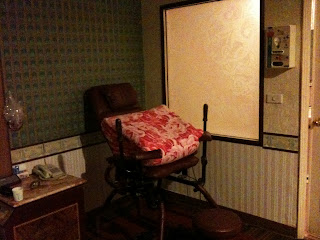The flight was delayed, the
train to Tainan I hoped to catch did not exist, and so I found myself in the
High Speed Rail Station wondering what to do as the young woman on the ticket
counter explained that the last train to Tainan had been over an hour ago. To my surprise she then offered a
number of helpful suggestions, she phoned my friend to explain the situation,
and I ended up staying the first night in a Motel. Yes, a proper Motel, just like the ones in countless
films. After the concrete, marble
and glass of the station this switch was reminiscent of a temporal leap from
hyper-modernity to 1960’s Americana.
The journey to the Motel bordered on the surreal as the taxi driver, my
friend’s cousin, and my friend via telephone tried to work out the address and
we slowly drove around the empty roads.
These areas surrounding
airports are intrinsically unsettling, with the numerous storage areas,
industrial units, wide empty roads, empty hotels, and lack of any sign of
habitation. There was little
indication aside from the road signs as to the location of this place,
non-place, and I thought of the hinterland of Heathrow, of the areas of
industrial sheds and navigation beacons set in fields that surrounded Speke
Airport in Liverpool.
The Motel was at the edge of
the town and seemed to be for those driving long distances. Or, indeed, for those who wished to
drive to a place where they could be alone, for the term ‘motel’ can, I have
been told, have the same connotations as the Japanese ‘love hotel’. And it is easy to see what those are
from the latter phrase. With that
in mind, I will leave you to speculate on the function of this chair.
The journey to Tainan on the
High Speed Train was wonderful. I
love these trains, their space and comfort, the sight of the landscape from
this speeding machine. I love the
announcements in, I presume, Mandarin, Taiwanese, and a strange
American/English. “We will now
make a brief stop at…..”, as if you will have 25 seconds to get off before the
train bullets out of the station, for nothing must stand in the way of the
speeding progress. I love the fact
that the trains arrive within a few seconds of the time stated, and that they
stop at exactly the right place marked on the platform for the carriage
door. None of that running down
the platform laden with bags to find the door here.
And so to Dorm 1828, a newly
refurbished hostel. If you ever
decide to explore the mountains of Taiwan, and Taiwan has some amazing
mountains so I have discovered, then come here. The place is comfortable, friendly, run by staff who know
everything about ‘extreme sports’, and with an interior décor that is
imaginative. As a dedicated
non-sports person who hides in books of philosophy I was fascinated by the
experiences of the boss/owner, who, over a couple of bottles of the best beer I
have ever had, told me tales of climbing up ice walls, and then explained the
business model behind the enterprise.
For not only does she provide accommodation, and information, and guides
to the wilder areas of Taiwan, but she also searches out Taiwanese designs,
furniture predominantly, and by getting them used by the heavy hands of
wandering back-packers, tests their functionality. She also has a very clear idea of quality, and we shared a
love of the ‘aesthetics of the everyday’, that is the quotidian beauty of the
conduit leading the power cables through the building. Dorm 1828 will be changing its name,
but as I was told the new name at the end of the third bottle of beer, it has
temporarily disappeared.
Tainan has some of the best
cafes I have ever been in, and my friend informs me this is but the tip of an
iceberg of comfortable coffee places where one can sit and read and muse all
day. One, which I have so far only
visited briefly, is next door to a second-hand bookstore. This is of course very dangerous, as I
can see my store of books will begin to increase at every visit to the café. Which, incidentally, is owned by the
same person who owns the bookshop.
In the cafes, as in the
hostel, there is the use of recycled furniture, old cabinets from shops and
houses, a variety of chairs and tables.
This interests me, and I am not yet certain as to what to think of this. My impression at the moment is that this
is a valuing of the past, of objects that speak of previous use and history,
that is a counterbalance to the hyper-modernity and industrialisation of the
cities. I write this in one of the
Houses for the Visiting Professors in the University. Outside there is a long lake, and over it are five small
bridges. Three of these bridges
date from the 13 century.










No comments:
Post a Comment